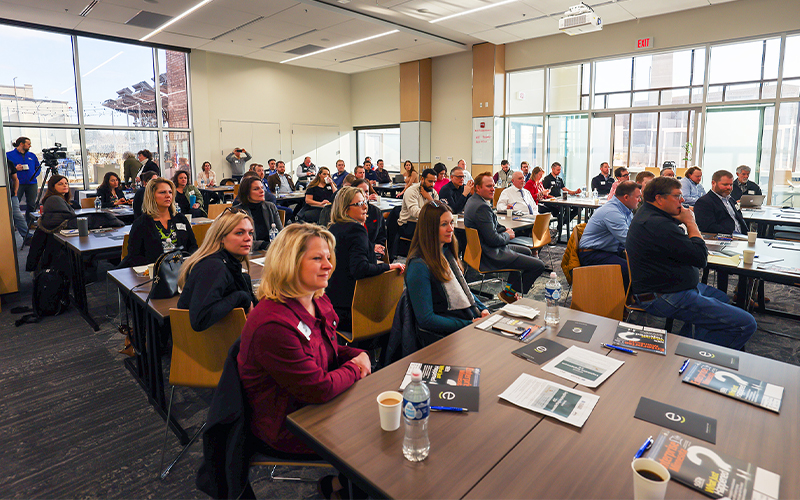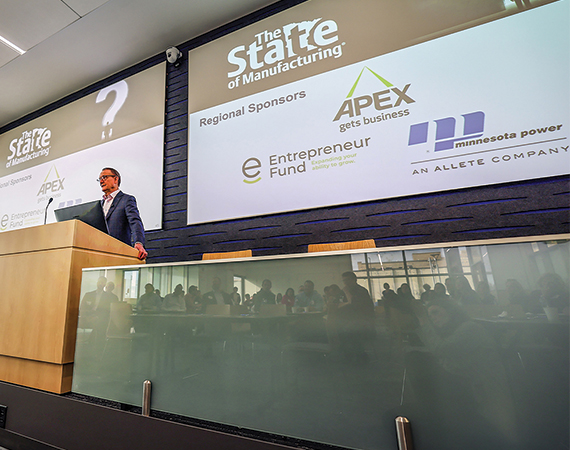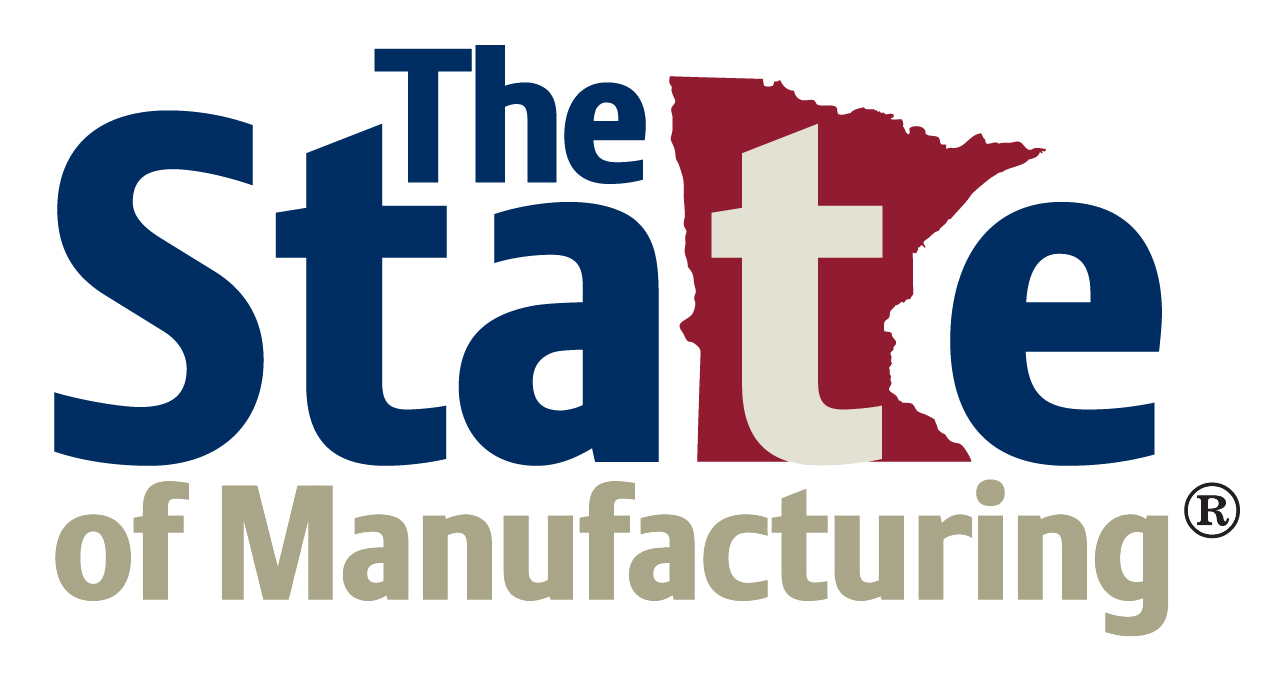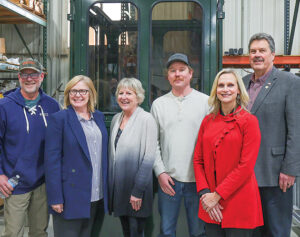Enterprise Minnesota has been working hard to tell manufacturers’ stories through its State of Manufacturing® survey, now in its 16th year. And the organization takes that message on the road, sharing the annual results in communities around the state. This February it organized an event in Duluth that drew an unusually robust crowd of around 70, says Arik Forsman, an economic development specialist for Minnesota Power, which hosted the gathering.
In all, 400 manufacturers were interviewed for the latest survey and another 200 participated in the related focus groups. Lynn Shelton, Enterprise Minnesota’s vice president of marketing and organizational development, says it has proven to be a useful undertaking.
“There are a lot of stakeholders who are not aware, or may just be becoming aware, of the value of manufacturers and how much they contribute to Minnesota’s economy,” she says.
The State of Manufacturing surveys manufacturing executives about their challenges and opportunities, the feelings they have behind the economy, and where business is headed. “We get the results and then we publicize the heck out of them,” Shelton says.
Bob Kill, president and CEO of Enterprise Minnesota, presented the survey results at seven regional events this year, including one in Minneapolis before an audience of more than 500 people.
He says it brings together all sorts of stakeholders, including educators, economic development folks, suppliers, lenders, and law firms.
“We see it as our role to bring these parties together to further manufacturing,” Kill says.
Forsman says he was impressed.
“I think that having them come up to Duluth and share highlights from their most recent survey and talk about some of the trends they’re seeing was pretty impactful for folks,” he says.
“Certainly, we seem to be seeing some challenges with our permitting system and the amount of legislation that manufacturers have had to adjust to recently,” Forsman says. “But there are also a lot of opportunities, too. And that was on full display.”

Kate Ferguson, director of trade and business development for the Duluth Seaway Port Authority, suggested Minnesota manufacturers could play a key role in driving the development of clean energy.
“We, as a state, have a really great opportunity to be the manufacturer of choice for the green economy,” she observed at the Duluth event.
Shelton says the survey has historically unearthed emerging issues before they were well recognized by mass media, including the present workforce shortage that researchers first noted as it began to loom about a decade ago.
In response, Enterprise Minnesota has worked to build stronger ties between manufacturers and educators.
Joe Mulford, president of Pine Technical & Community College in Pine City, says those efforts are paying dividends and are encouraging more young people to go into manufacturing. During a video portion of the Duluth event, he said: “I don’t recognize there’s ever been more support for that pathway.”
“So, enrollment in higher education has been on a historical decline over the last decade. The exception to that has been in career technical education programs, and I think that’s exciting as we think about the future,” Mulford said.
Elena Foshay, Duluth’s director of workforce development, has been working with local stakeholders as part of a federal Good Jobs, Great Cities initiative: “The number one priority was just raising awareness about the manufacturing industry in our region and the jobs that it provides, and then really thinking about how do we build stronger linkages and connections between career tech ed in the K-12 system up to community college, four-year college and beyond, and then with strong ties to jobs, to employers.”
Kill stressed that building a robust talent pipeline is crucial to manufacturers’ success.
“If you can’t get people, you can’t grow your business,” he says.
Brad Pieper, CEO of American Peat Technology in Aitkin, says finding capital has been another recent challenge. “I see inefficiency in the market right now, where there’s all this capital sitting on the sidelines, yet the cost of borrowing is super high and there’s a lot of great projects out there.”
The survey raises the profile of Minnesota manufacturing, according to Kill.
The annual report is time-consuming and expensive, but Shelton says a team of 52 sponsors make it possible.
“They get out of it just as much as we get out of it, in terms of connecting with manufacturers, connecting with other suppliers, connecting with other stakeholders, and they really value those connections,” she says.
Rachel Johnson, president and CEO of APEX, an organization that works to drive investment in northeast Minnesota, notes the Duluth event brought together a broad cross-section of people.
“It wasn’t just manufacturers who attended but also all the support people, including folks from academia and financiers,” she says. “I think there’s an interest in how we all intersect and can help each other, so we have a bigger voice.”
Johnson describes what she sees as a growing spirit of “coopetition.”
She explains that manufacturers “recognize that they need to come together to address certain barriers they face in the state.” But Johnson says businesses also are competing fiercely for workers.
Michael Lattery, director of business finance at the Entrepreneur Fund, says Enterprise Minnesota does manufacturers a service in simply bringing them together.
“Small business owners’ voices are hard to gather, especially when they’re busy working all the time. So, when there’s a public opportunity to meet like this, it’s a great way to elevate what’s really important to small manufacturers throughout our region,” Lattery says.
“It matters a lot to be able to invite people to something like this and to hear what’s really on the minds of manufacturers,” he says.
He says such events also give manufacturers a chance to learn from one another and expand their networks in ways that lead to benefits they might not have anticipated.
“Connections are real. And that’s one of the magical things that can happen at events like this,” Lattery says.
Shelton says Duluth has emerged as a true manufacturing ally in recent years. “Manufacturing has seen a renaissance, and Duluth is a part of that renaissance.”
Return to the Summer 2024 issue of Enterprise Minnesota® magazine.



